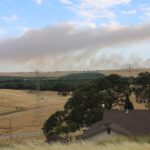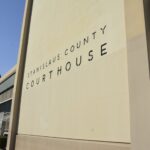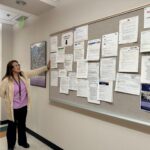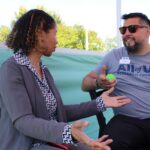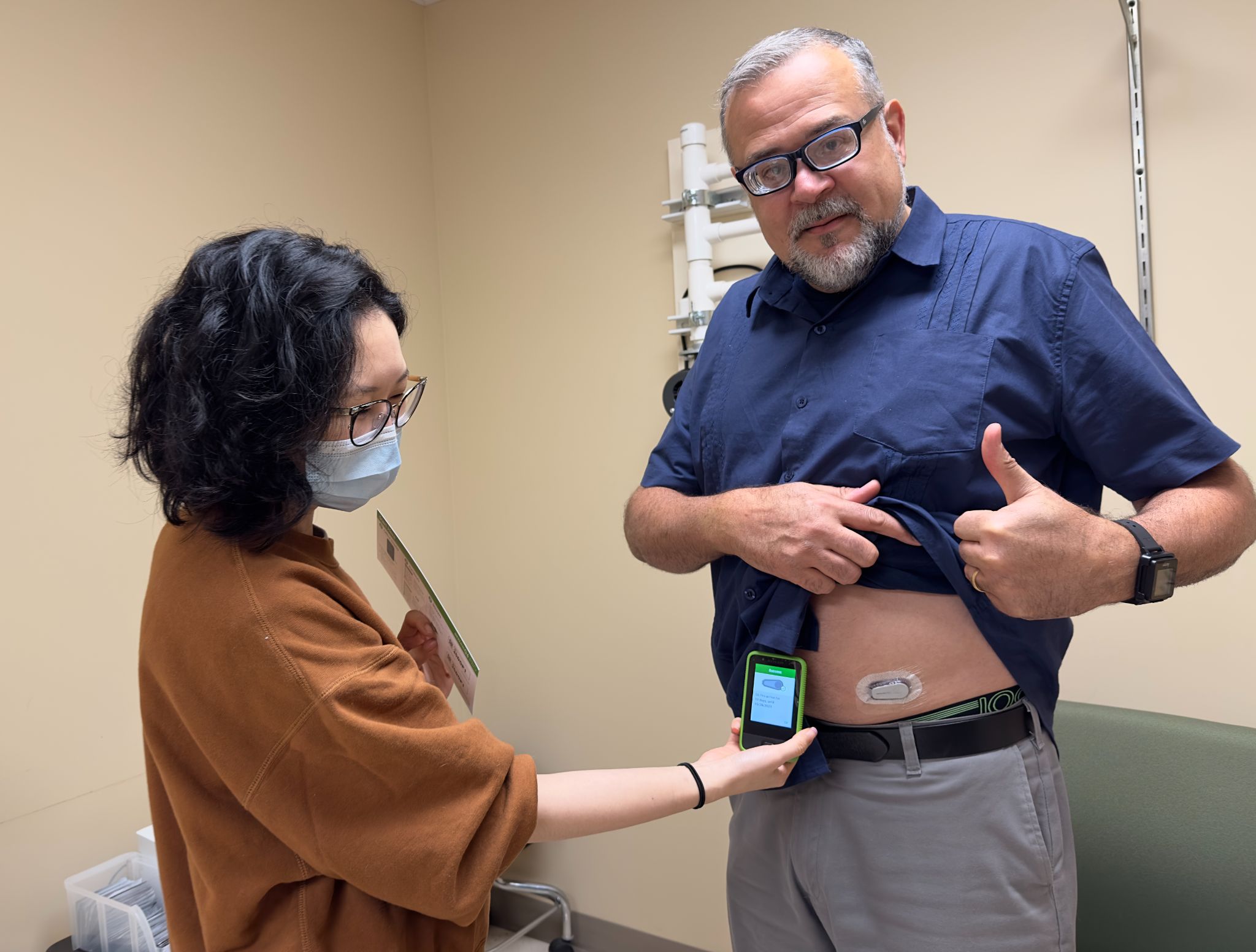Hugo Campos passed out 20 years ago while running to catch a train in the Bay Area. He was 37 at the time, and neither he nor his doctors understood what happened.
Campos waited three years before doctors could properly identify and begin to treat his condition. They eventually diagnosed him with hypertrophic cardiomyopathy, or HCM, a genetic heart condition that can cause sudden death.
The experience ignited Campos’ advocacy for personalized and involved health care treatment. Campos, a self-identified Portuguese-Latin American man from Brazil, now works with medical researchers as his full-time job, as a paid participant in multiple studies.
Campos said he landed in many roles in medical research projects after realizing his health condition would not permit him to return to advertising.
“Above all, I want to help researchers because a lot of times researchers don’t have the perspective that a patient might have or that a participant in research might have,” Campos said. “Particularly when we talk about communities that may be underrepresented in biomedical research.”
Campos has been a participant in the National Institutes of Health’s “All of Us” Research Program since its inception in 2015.
Through Campos’ involvement with the program, researchers are able to study his unique genetic makeup and his experiences with emerging medical technology for his condition. Researchers hope to use what they find to help people with similar health traits in the future.
The All of Us program focuses on diversifying biomedical research and researchers in the country through building community connections and sharing information, offering many benefits to its participants.
While the study focuses on diversifying how research is viewed, it will take some time before the data accurately represents the nation.
Case in point, out of more than 756,000 participants currently enrolled in the study, half are white. Hence, the program aims to adequately understand the diverse makeup of all the country’s residents — but Black, Brown, Indigenous and LGBTQIA+ people are underrepresented.
The All of Us mobile tour has plans to make its way into the San Joaquin Valley again this spring, with the aim of finding people from a wide range of communities to enroll in the study.
Researchers hope to gain more participants from this area, which holds two of the country’s most ethnically diverse large cities: Fresno and Stockton.
The tour will make three Stockton stops in May with the help of Little Manila Rising, the Golden Villa Farmers’ Market and the San Joaquin County Fairgrounds Flea Market.
In the past, the program has partnered with the Stockton Earth Day Organizing Committee and Community Medical Centers in an effort to enroll participants.
What is the All of Us study?
In 2015, the Precision Medicine Initiative was established for a few reasons, including to create a voluntary national research cohort and improve relations between private medical groups, researchers and patients to empower U.S. residents with tools to better manage their health.
The All of Us program was born from this initiative. All of Us has a goal of enrolling a million people into the study, and creating the most diverse biobank and research database for current and future researchers to study.
By collaborating with and funding local institutions across the country, the All of Us network is able to keep researchers connected and help foster discussion between participants and the people studying their samples.
All of Us is designed to give researchers the tools they need to develop questions around particular health issues in specific populations. The program is not designed to pull people into clinical trials for medications.
The program offers a one time compensation of $25 to people who choose to send in DNA samples. It also offers genetic testing and counseling, plus an opportunity to keep medical records in a safe place that also allows researchers to study changes in your body over time.
The ratio for primary care physicians and specialists per 100,000 residents in the San Joaquin Valley falls below the state average. Because of this, many residents may not be able to get consistent or adequate care.
It can be difficult to advocate for oneself or a loved one in a doctor’s office without knowing how to ask for help. Participants in the study are given information which can lead to better communication with healthcare professionals.
Campos said when the All of Us program provided him with information about his genetics, he used the information to convince his doctor to run more tests and continue searching for the root cause of his HCM condition.
The tests came back inconclusive, but Campos is proud that his contribution to the study of HCM may one day lead to an answer.

Dealing with history of mistreatment
Researchers must overcome hurdles gathering data from diverse populations in a place like the San Joaquin Valley.
That’s due to years of mistrust built up against the medical establishment, particularly in communities of color, due to years of medical mistreatment.
“It’s been really difficult (to enroll people of color in the study) because of the very valid mistrust people have as a reaction to our country’s history with clinical and medical research trials,” said Dr. Melissa Bondy, Stanford professor of epidemiology and population health.
Some of that history has included instances of forced sterilization.
For the Black community in particular, two stories of unethical treatment have been addressed by the All of Us community engagement team.
One of the most well-known was the “Tuskegee Syphilis Study” conducted by the U.S. Public Health Service from 1932 to 1972.
The original name for the study was the “Tuskegee Study of Untreated Syphilis in the Negro Male.” As the name suggests, government-funded researchers watched the deadly disease develop for decades without treatment in hundreds of Black men — without their consent or plans to cure the patients.
There’s also the story of Henrietta Lacks, who was diagnosed with cervical cancer in 1951. Lacks died of the cancer that year, but her cells have been used in several studies, including the development of the COVID-19 vaccine.
Lacks’ family was unaware of her non-consensual contributions to medical science until more than 20 years after her death.
Last March, the program addressed the country’s disturbing history of medical mistreatment in the Black community by speaking directly with Lacks’ descendants and children of the victims involved in the syphilis study at Tuskegee.
The community of Tuskegee in Macon County, Alabama discussed with researchers how they would like to see the All of Us teams handle their concerns about lack of digestible information. The research teams were also urged to encourage participants to ask questions throughout the study.
The All of Us researchers and community outreach specialists within the program recognized the need for transparency of how data will be collected and used in the study. They also seek to create pathways for conversations with participants whenever it is requested.
Although that alone cannot undo years of pain caused by those unethical medical research practices, it can help build new bridges of trust.
Aside from the issues of cultural mistrust, people also have worries about privacy.
“I would say the number one reason that people don’t want to join the study is about their data security and being concerned that they’re sharing their data essentially, forever with the study, with the federal government,” said Dr. Alexander Borowsky, lead researcher for the All of Us program and professor of pathology and medicine at UC Davis.
“And understandably so. There’s a long track record of sort of poor use of data over the years and, and we have a lot of making up to do.”
In order to combat this, the All of Us program has extensive privacy and security protocols. One of the promises made by the program is returning all data discovered about each participant, to each participant.
“We’re not 23andMe,” Borowsky said about the commercial DNA test that quickly provides customers with information. The genetic testing firm reported a data breach last year.
“We’re collecting DNA samples for research. It’s gonna take a while, we’re trying to do things right. But we will give it back to you. We believe in giving it back to you,” Borowsky said.
Part of the process of collecting DNA samples for the national BioBank includes anonymizing each sample. That way, it takes time to trace each participant’s information back to them, and no one researcher can look up a person simply because they have a sample.
While the program works to keep participant information safe, it is also working to engage in conversations about how the data is being used.
All of Us Chief Engagement Officer Dr. Karriem Watson said the program has gone beyond obtaining “informed consent” from participants by actively working with people to help them understand the process.
Ultimately, participants are able to opt out at any time.
Community ownership
Participation in the program can be as simple as taking surveys or researchers can ask participants to work more closely with them.
All of Us is working to directly counteract the history of biased medical research. Watson acknowledges consent and participation from diverse populations is the best way to go about it.
He and other program leaders understand the importance of staying in touch with community leaders to truly gain the trust of residents.
For example, Watson said it took years before his team was able to bring the program to Macon County and directly address the concerns of their community.
When asked why he feels it’s important to participate in the research program, Campos said, “It’s my little legacy. It’s my small contribution to the human race.”
Initially, the program is set to last “10 years or more” in order to allow researchers to study the large collection of data over a longer period of time.
For more information on the All of Us program or to join, visit allofus.nih.gov.
Vivienne Aguilar is the health equity reporter for the Central Valley Journalism Collaborative, a nonprofit newsroom covering the San Joaquin Valley, in collaboration with the California Health Care Foundation (CHCF).





